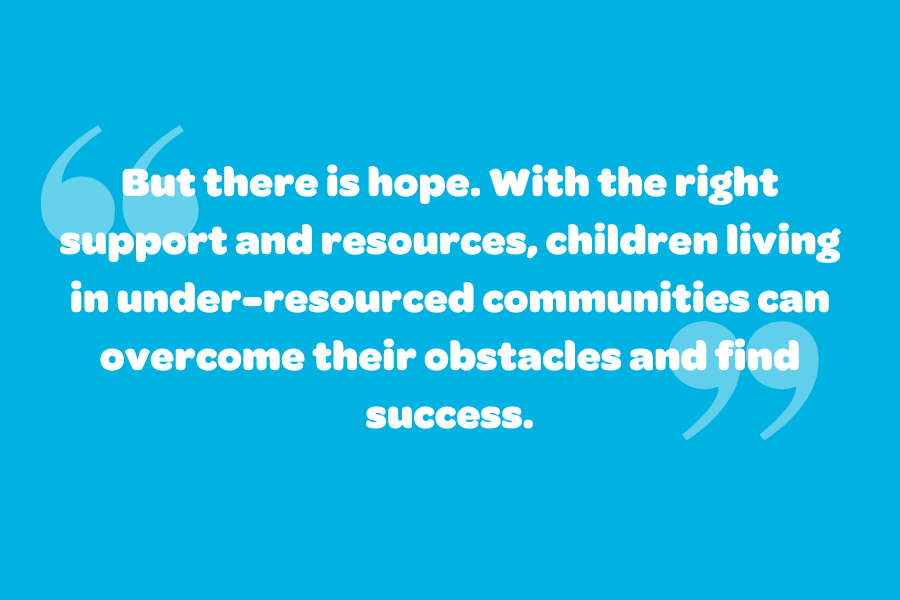It takes a village to raise a child, and our village is struggling. Why? Simply put, childhood poverty. The number of children living in poverty in Orange County is staggering, with more than 58,000 children impacted. That number represents a poverty rate of 19%, higher than the overall Florida rate of 18.2%. Growing up in an under-resourced community too often paves the way for long-lasting consequences.
Children living in poverty are three times more likely to experience abuse, seven times more likely to experience neglect and five times more likely to drop out of school. Sadly, challenges seem to be even more concentrated among minority populations; according to the Annie E. Casey Foundation, though Black children represent just 14% of the general population, they make up 23% of the population of children in foster care. The majority of entries into foster care stem from neglect, which are often fixable family issues — challenges that, when addressed on the front end, can significantly reduce the number of families that come into contact with the child welfare system. At Children’s Home Society of Florida (CHS), we are dedicated to keeping more families safe, strong, and together — and out of foster care — by partnering with families before crises occur.
Children growing up in under-resourced communities often experience multiple barriers to education, which hinder their academic success from kindergarten through adulthood. Students who come from low-income families are at a higher risk of academic underachievement than their more affluent peers. On a large scale, there are two significant factors that can affect a child’s success:
Limited access to quality early childhood education: 90% of brain development occurs by age 5, and that includes the executive-level functioning required for critical and strategic thinking later in life. Early childhood education provides children with a foundation for learning, socialization, and emotional development that sets the stage for success. Children who receive quality adult interaction and early learning in their first years are 50% less likely to need special education, 70% less likely to be arrested for a violent crime, and 50% less likely to become teen parents.
Children in poverty are five times more likely to drop out: The stresses and daily challenges that accompany childhood poverty can negatively impact children. Children may need to work to support the household, or they may assume the role of a primary caregiver for siblings or aging parents, all of which can lead to difficulties in school and poor academic performance … increasing the likelihood of dropping out. And if they do “drop out,” they are 63 times more likely to be incarcerated. Currently, high school dropouts account for 80% of the prison population.
But there is hope. With the right support and resources, children living in under-resourced communities can overcome their obstacles and find success. CHS, in partnership with Orange County Public Schools (OCPS) and the University of Central Florida, developed the Community Partnership Schools model to address some of the most pressing challenges affecting students’ ability to learn and succeed. Through this initiative, we’re helping to disrupt cycles of childhood poverty through education by convening nearly 50 key partners, including school districts, health care centers, universities and others, to address critical issues impacting success — in the classroom and beyond. By addressing challenges such as access to health and dental care, counseling, nutrition, and more, CPS lifts heavy burdens from students and teachers. The result? Improved academic performance and soaring graduation rates … on average, high schools that have adopted this model have experienced a 30% increase in graduation rates.
But planning for success begins long before high school. The Florida Chamber Foundation has developed The Florida Gap Map, an interactive tool that helps visualize the intersection of third-grade reading scores for every public school in Florida with childhood poverty rates and community health metrics, down to the ZIP code. We know significant gaps exist in the space of access and opportunities for our most vulnerable populations and believe Florida’s global competitiveness depends on a high-quality education system. We encourage community and business leaders to get involved with CHS and The Florida Chamber Foundation so we can work together to cut childhood poverty in half by 2030 and continue advancing the mission to secure Florida’s future.
Andry Sweet serves as president and CEO of the Children’s Home Society of Florida. Jarvis Wheeler is the senior director for Community Partnership School Strategies with CHS.










